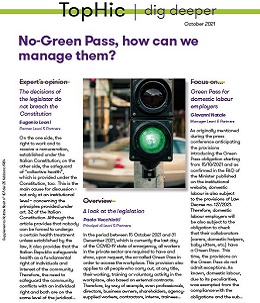Nature of the obligation
In the period between 15 October 2021 and 31 December 2021, which is currently the last day of the COVID-19 state of emergency, all workers in the private sector are required to have and show, upon request, the so-called green pass in order to access the workplace. This provision also applies to all people who carry out, at any title, their working, training or voluntary activity in the workplace, also based on external contracts.
Therefore, by way of example, even professionals, directors, business owners, shareholders, agency-supplied workers, contractors, interns, trainees, maintenance service providers, salespeople, etc. must hold a green pass. The Ministry of Labour recently confirmed that also the employers of domestic workers are subject to the green pass verification obligation.
As a result, domestic workers (domestic help, caretakers, babysitters, etc.), when accessing their workplace, will be subject to the verification of their green pass. The Ministry of Labour also specified that people working remotely are not subject to the green pass verification: nonetheless, the Ministry pointed out that the use of the so-called smart working must not be a way to avoid the green pass obligation.
Obligations and verification
Within their obligations and functions, employers need to define by 15 October 2021 the operational procedures to organise the verification of the green pass requirements of their workers, formalising them in writing for the purposes of proof, also with the aim of avoiding possible sanctions.
Although employers can proceed with sample verifications at a later time, it is advisable to check the possession of the green pass of all workers when they access the workplace. The verification will take place according to the indications provided by Prime Ministerial Decree dated 17 June 2021, i.e. using the “VerificaC19” app.
It is specified that those workers exempted from the vaccination campaign are not subject to the green pass obligation, provided that they have a proper medical certification issued based on the criteria defined under the circular letter of the Ministry of Health. This certification will have to be shown upon verification, unless the information is already contained in the green pass.
Verification of the green pass requirements by employers must also include people providing services under external agreements (contract, travel, etc.) and the verification procedure will have to be specified in the company’s procedure, requiring, for example, the external providers to only send workers holding a green pass and to immediately notify the company of a possible negative outcome of the green pass verification. As concerns agency-supplied workers, it is deemed that the verification can be carried out solely by the benefitting company.
It is nonetheless advisable to coordinate with the supplying agency, which could introduce - in its capacity as employer - sample checks on their supplied employees. The person in charge of the verification can be either the employer or one or more delegates. The delegates will have to be appointed with a formal written deed and to be provided with guidelines outlining the tasks entrusted to them, such as for example the task of filling in a register of the checks carried out, aimed at demonstrating the actual performance of the required verifications.
The introduction of the green pass requirement to perform working activities does not remove the obligation for companies to comply with the measures provided for by the safety protocol dated 24 April 2020 entered into by the Government and social parties, such as distancing, use of masks, etc. As a final note, we suggest, when adopting the procedures above, involving the person in charge of safety at work and the data protection officer, for the matters pertaining to them.
Absence of green pass and effects on the working relationship
Should workers notify the company that they do not hold a green pass, or should they not have it when accessing the workplace, they will be considered as unjustified absentees until they can show it and, in any case, no later than 31 December 2021, without disciplinary consequences and with the right to keep their jobs. It is not necessary to formalise the unjustified absence in writing to the employees, since this is automatic by Decree.
For the duration of the unjustified absence, no wage, nor any other compensation or remuneration is due to the employee. In case of companies with less than 15 employees, the employer can suspend the worker after the fifth day of unjustified absence for a period corresponding to that of the employment contract entered into for his/her replacement, in any case not longer than 10 days, renewable only once, and not beyond 31 December 2021.
In this case, it is deemed that the suspension should be formalised to the worker and that the absence from work applies for the whole suspension period, regardless of the early obtainment of the green pass by the worker.
Fines
The access of workers without green pass to the workplace is sanctioned with a fine ranging from Euro 600.00 to Euro 1,500.00, doubled in case of repeated violation. Workers could also be subject to disciplinary measures.
Employers who do not comply with the required verifications, i.e., who will not implement the organisational measures to ascertain that the workers hold a green pass by 15 October 2021 will be subject to a fine ranging from Euro 400.00 to Euro 1,000.00, doubled in case of repeated violation. Fines can be ascertained by all designated inspection bodies and are imposed by the Prefect.
Latest updates
On 8 October 2021, Law Decree no. 139/2021 was published in the Official Gazette, introducing urgent measures to regulate the access to cultural, sports and leisure activities and integrating the provisions on the green pass requirement already contained in Law Decree no. 127/2021, regulating the access to the workplace effective from 15 October 2021.

